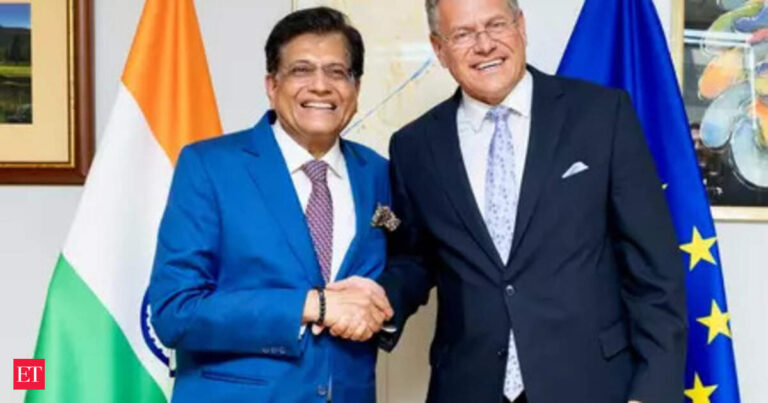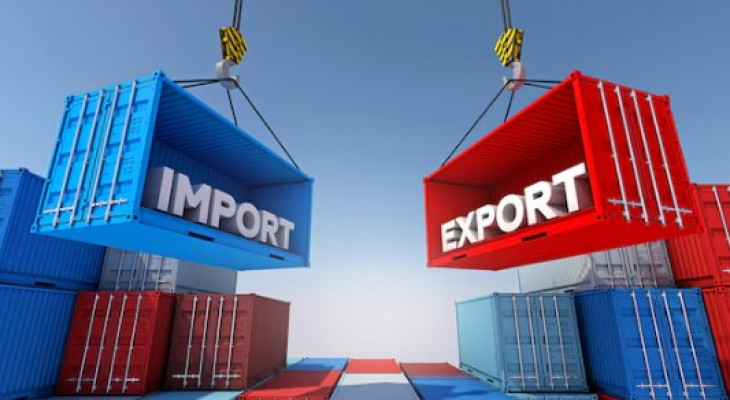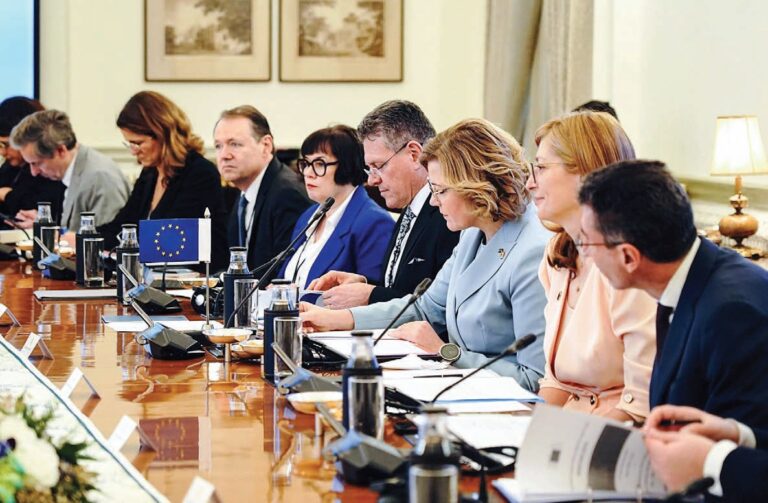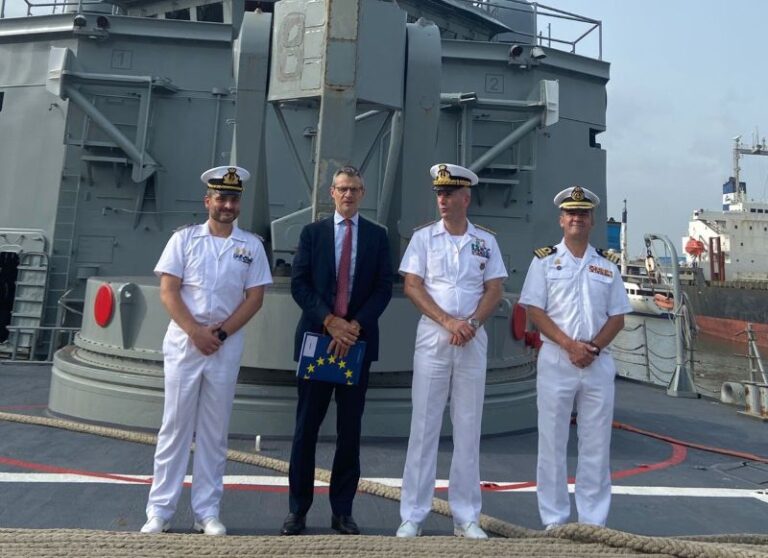
Beyond economic interests, the EU aims to guarantee India’s support on international security issues, in particular cyberrencies, Indo-Pacific tensions and the current Ukraine-Russian conflict.
India and the European Union have undertaken to finalize a free trade agreement by the end of the year, marking an important step in their current negotiations. This commitment aims to mitigate the impact of American tariff increases while improving economic cooperation between the two regions.
The announcement was made on Friday during a joint press conference by the president of the European Commission Ursula von der Leyen and Prime Minister Narendra Modi, during the two -day visit to Von der Leyen in India.
The president of the European Commission, Ursula von der Leyen, accelerates the EU’s commercial program to sail in an increasingly complex landscape. By sealing the agreement on Mercosur, by reorganizing the agreement of Mexico and by reviving negotiations with Malaysia, it strategically positions the EU to counter American protectionism. At the heart of this strategy is the free trade agreement with India – a crucial economic partner and a formidable negotiator – arousing the EU’s commitment to strengthen its global trade alliances.
India emerging as the largest commercial partner in the EU in 2023, the deepening of links has a strategic meaning, especially since Europe seeks to diversify its supply chains far from China. The high-level visit and commercial talks are about to lay the foundations for a robust EU-India partnership, potentially enhancement of the global trade dynamics. However, the success of these negotiations depends on overcoming significant obstacles, including the high prices of India on cars and wine.
Cover geopolitical pressures
The awareness of the EU in India comes at a time of climbing geopolitical tensions. With Trump’s “America First” position which reshapes American trade policies, the EU seeks to counter tariff threats and reduce its dependence on China by diversifying supply chains and reinforcing economic ties with India. According to EU officials, this approach is crucial to maintain the stability of world trade: “At a time of geopolitical pressures, the diversification of partnerships is not only strategic – it is essential.”
Beyond economic interests, the EU aims to guarantee India’s support on international security issues, in particular cyberrencies, Indo-Pacific tensions and the current Ukraine-Russian conflict. The reports suggest that an agreement to share classified security information is on the agenda, highlighting an increasing strategic alignment between the two regions. This deepening partnership is also considered a strategic counterweight to the growing influence of China in Asia-Pacific, strengthening the EU’s commitment to a stable and secure world order.
And while others are only interested in export and extraction, we want to see the local industries flourish in partner countries.
President Ursula von der Leyen
Navigation of complex negotiations
EU’s renewed emphasis on India is a strategic maneuver to sail in a rapidly evolving geopolitical landscape. By intensifying commercial and technological cooperation, the EU aims to strengthen its position in the Asia-Pacific region while counterbalancing American protectionism and the assertive commercial practices of China. For India, this partnership presents an opportunity to improve its global commercial footprint, access to advanced technologies and strengthen its strategic autonomy. As the largest democracy in the world and a rapidly growing economy, India is a pivotal player in the formation of the future of world trade and geopolitics.
While the EU is wishing to improve trade relations, negotiations should be difficult. The protectionist position of India and the difficult negotiation approach could complicate discussions. To fill these differences, the EU may need to respond to the demand for recognition from New Delhi as a secure data of data – a crucial factor to advance digital trade.
The visit of the European Commission Ursula von der Leyen, accompanied by leaders of the EU nations, intervenes in the midst of geopolitical tensions. The threat of American president Donald Trump to impose reciprocal prices on all nations, including the EU and India in April, adds emergency to talks.
“Two decades of strategic partnership between India, the organic and natural EU”
PM Modi
However, despite shared concerns about China, their strategic priorities diverge – India focuses on border security, while the EU is mainly concerned about the Ukrainian -Russia conflict. These different perspectives could shape the scope and pace of negotiations.
Resumption of talks in free trade agreement
The European Union remains the largest trading partner in India in goods, bilateral trade has increased by almost 90% over the past decade to reach $ 137.5 billion in the last financial year. Based on this momentum, the EU and India should resume negotiations from the free trade agreement (ALE) from March 10 to 14, 2025 in Brussels. These discussions aim to strengthen economic cooperation by focusing on key areas such as digital trade, intellectual property and sustainable development.
The EU seeks to guarantee better access to the market by pleading for lower prices on cars and wine, while signaling flexibility on agricultural issues to accelerate the negotiation process. This strategic thrust is aligned with the EU’s objective to diversify supply chains and improve economic security in the context of the change in global trade dynamics.
More than 6,000 European companies operate in India, generating millions of jobs and contributing significantly to the country’s economic growth. A successful ALE would consolidate this partnership more, unlocking new market opportunities and stimulating investments on both sides.
Commerce and technology advice: strengthening strategic links
The EU-Indre Trade and Technology (TTC) council has become a vital platform to deepen cooperation in trade, technology and security. The next TTC meeting will focus on the progression of clean and green technologies, improving the digital infrastructure and the resilience of the supply chain. In the midst of the assertive commercial practices of China and American tariff threats, the TTC aims to strengthen economic security and to promote strategic autonomy.
The EU also seeks to take advantage of the strategic position of India to counter the domination of China in technological supply chains. This approach is aligned with the broader “disintegration” strategy in Europe, which focuses on the diversification of supply chains and the reduction in dependence on China for essential products.
Belgian economic mission: strengthening bilateral links
In addition to the EU-Indre talks, the Princess Astrid of Belgium will conduct the Belgian economic mission in India from March 2 to 7, 2025. This visit underlines the commitment of Belgium to improve economic cooperation, by focusing on six key sectors: climate and renewable energy, health and life sciences, construction and eco-construction, transport and logistics, space and defense and defense, The decaran decarbonization.
Strategic implications and future perspectives
In a world marked by geopolitical uncertainty and changing alliances, the proactive commercial diplomacy of Von der Leyen is both timely and necessary. However, the real test lies in the balance of the affirmation of affirmation with compromise, in particular with India, whose economic influence and strategic autonomy make it a difficult but essential partner. While the EU sails on this complex terrain, it must remain firm but flexible, ensuring that its commercial policies are sufficiently resilient to resist the reverberations of the Trump protectionist stand
For India, this partnership offers a strategic opportunity to extend its global commercial scope, access advanced technologies and strengthen its strategic autonomy. As the greater democracy in the world and a rapidly growing economy, India plays a crucial role in the formation of global trade and geopolitical dynamics.
EU diplomatic awareness demonstrates a pragmatic approach to deal with global challenges. While Brussels and New Delhi engage in high issues negotiations, the results could reshape trade and security dynamics across Asia-Pacific and beyond, paving the way to a more balanced and more resilient world order.



